NeoPixel Shield - 40 RGB LED Pixel Matrix
This is the NeoPixel Shield from Adafruit. This Arduino shield is equipped with 40 WS2812 RGB LEDs arranged in an 5x8 matrix with on one pin (Digital #6) needed to control them all.
Each shield is powered by the 5V onboard Arduino supply and as long as you aren't lighting up all the LEDs full power white that should be fine. You can also solder in the included terminal block to attach an external 4-6VDC power supply in case you need more power than what the Arduino provides.
Additionally, you can chain as many of these panels together as you'd like when tiled separetely from the Arduino. For the second panel, connect the DIN connection to the first panel's DOUT, connect the ground pins together and power with 5V. It should be noted that after five or more panels you may run low on RAM if you're using an Arduino Uno.
NeoPixel Shield - 40 RGB LED Pixel Matrix Product Help and Resources
Core Skill: Soldering
This skill defines how difficult the soldering is on a particular product. It might be a couple simple solder joints, or require special reflow tools.
Skill Level: Noob - Some basic soldering is required, but it is limited to a just a few pins, basic through-hole soldering, and couple (if any) polarized components. A basic soldering iron is all you should need.
See all skill levels
Core Skill: DIY
Whether it's for assembling a kit, hacking an enclosure, or creating your own parts; the DIY skill is all about knowing how to use tools and the techniques associated with them.
Skill Level: Noob - Basic assembly is required. You may need to provide your own basic tools like a screwdriver, hammer or scissors. Power tools or custom parts are not required. Instructions will be included and easy to follow. Sewing may be required, but only with included patterns.
See all skill levels
Core Skill: Programming
If a board needs code or communicates somehow, you're going to need to know how to program or interface with it. The programming skill is all about communication and code.
Skill Level: Rookie - You will need a better fundamental understand of what code is, and how it works. You will be using beginner-level software and development tools like Arduino. You will be dealing directly with code, but numerous examples and libraries are available. Sensors or shields will communicate with serial or TTL.
See all skill levels
Core Skill: Electrical Prototyping
If it requires power, you need to know how much, what all the pins do, and how to hook it up. You may need to reference datasheets, schematics, and know the ins and outs of electronics.
Skill Level: Rookie - You may be required to know a bit more about the component, such as orientation, or how to hook it up, in addition to power requirements. You will need to understand polarized components.
See all skill levels
Comments
Looking for answers to technical questions?
We welcome your comments and suggestions below. However, if you are looking for solutions to technical questions please see our Technical Assistance page.
Customer Reviews
No reviews yet.

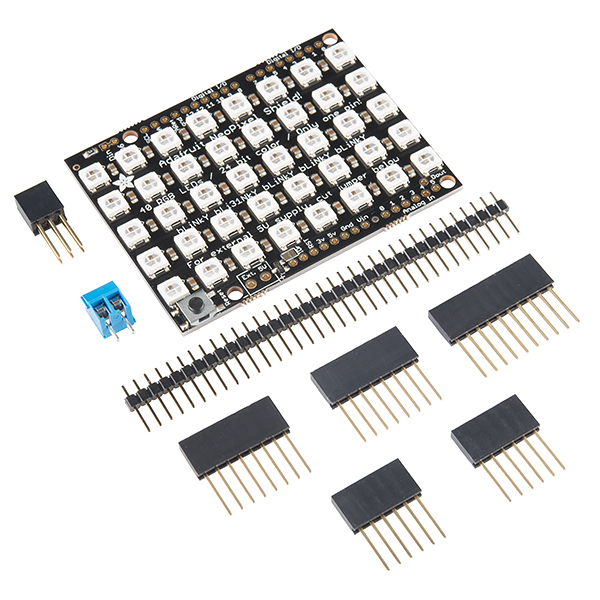
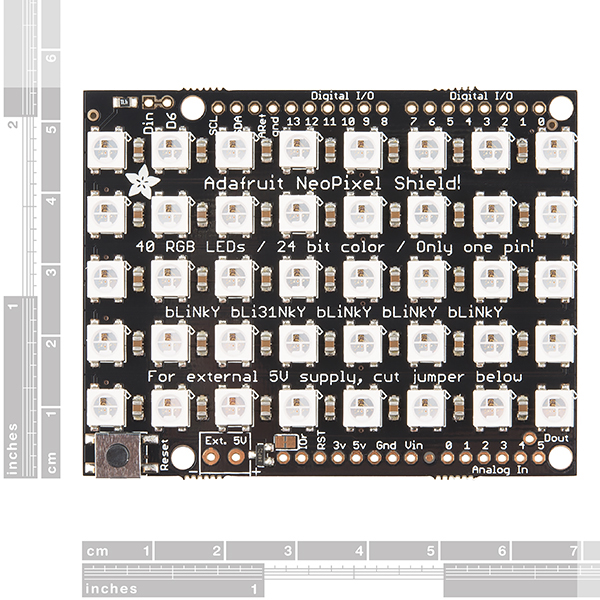
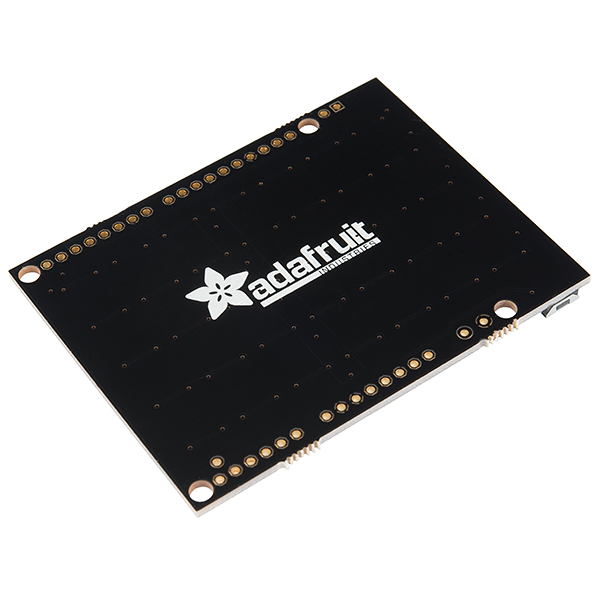
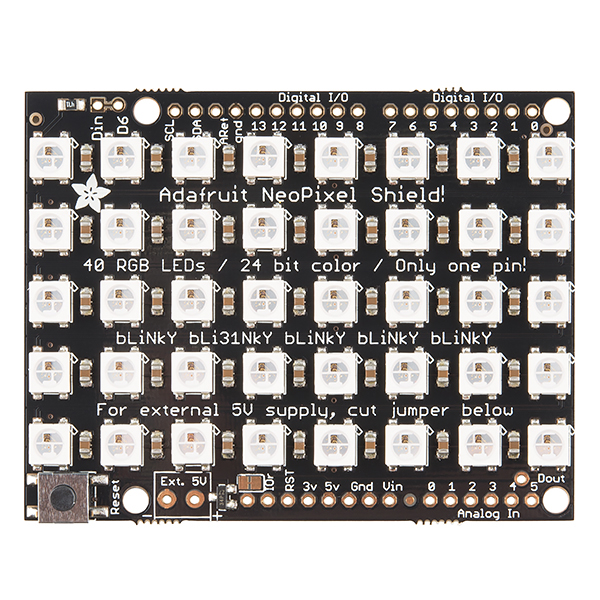
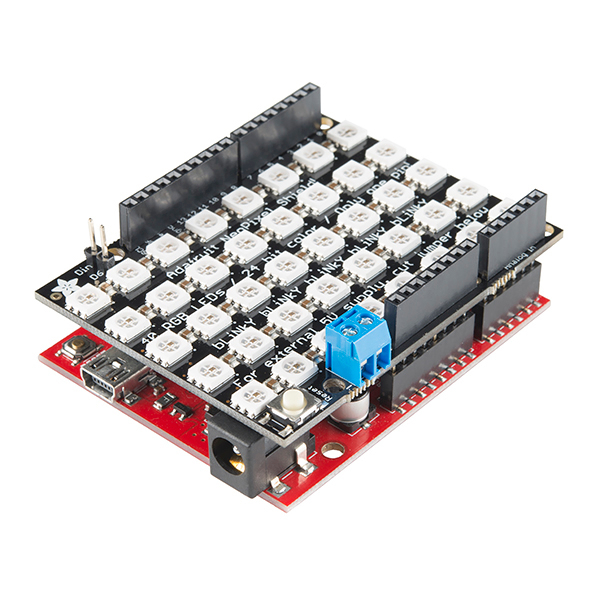
This product is great. The LEDs are quite vibrant. I have mine doing a random color dance - it's like a fireworks show.
With all LEDs on full brightness and white, the load approaches 2.5A, so you can't do that without external power. But if you hook up the extra power and do it, be sure to bring sunglasses, because these LEDs are crazy bright. I never run them on full brightness.
Good on you SparkFun for carrying these. Small, innovative DIY electronics companies are the best! Really, you guys rock.
I received the product announcement and had to read it several times, shake my head, and check to see if I took my Medication. This is great that the two are working together. Adafruit and SparkFun = a lot of potential for the community.
Remember the lesson you learned from Raiders of the Lost Ark: Don't stare at the glowey thing - this shield is face meltingly bright.
Beware my tale of woe. I bought one of these for a game I was thinking about designing. I decided to use the breakaway headers because it is a cleaner look than the stackable headers. It wasn't until after I had nicely soldered in all 32 pins and had it connected to my Arduino that I started to wonder how I was going to connect my other devices to the Arduino pins.
On the plus side, it gave me an excuse to purchase another of these -- I didn't feel up to solder-sucking that many header pins. On this second board, I used the stackable headers and now have my buttons and switches working, in addition to the NeoPixel Shield array.
What's the 2x3 header for? Doesn't seem to fit anywhere...
FINALLY! SparkFruit-AdaFun IS BECOMING A REALITY!!!!!!
Well its great to see that two companies in the same field that are innovating & developing are getting along so well that things like this are possible. It really shows how great you two are.
I'm looking forward to Nate on Ask an Engineer Saturday (Jan 11, 2014).
wow, I'm not really sure how I feel about those names...
we tried to merge with makerbot on 4/1 (MakerFruit AdaBot Industries) - but it was called off due to investor relations.
So we're unlikely to see MakerSparkFruit AdaFunBot Industries pt?
you can ask nate on ask an engineer tomorrow night :)
i asked bre the ceo of makerbot if we could make the announcement on 4/1 (it happen to be april fools day) but he said no, raising a round at the time and would freak out people... and that is why we were not able to say for at least one day we were MakerFruit AdaBot Industries.